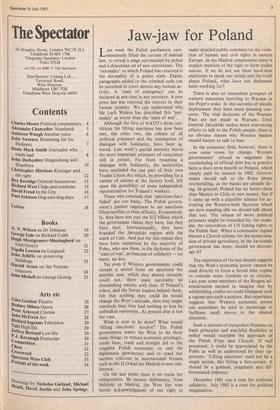Jaw-jaw for Poland
Last week the Polish parliament cere- moniously lifted the curtain of martial law, to reveal a stage surrounded by police and a draconian set of new restrictions. The 'normality' to which Poland has returned is the normality of a police state. Elastic paragraphs added to the criminal code can be stretched to cover almost any human ac- tivity. A 'state of emergency' can be declared at any time in any province. A new press law has restored, the censors to their former tyranny. We can understand why Mr Lech Walesa has described this 'nor- mality' as worse than the 'state of war'.
Although the first of NATO's three con- ditions for lifting sanctions has now been met, the other two, the release of all political prisoners and the resumption of dialogue with Solidarity, have been ig- nored. Last week's partial amnesty leaves the most important prisoners of conscience still in prison. For from resuming a dialogue with Solidarity, the authorities have rescinded the one part of their own Trades Union Act which, by providing for a variety of unions at the factory level, left open the possibility of some independent representation for Poland's workers.
Those who conclude that 'sanctions have failed' are too hasty. The Polish govern- ment's patient eagerness to see sanctions lifted testifies to their efficacy. Economical- ly, they have not cost the $12 billion which the government claims they have, but they have hurt. Internationally, they have branded the Jaruzelski regime with the mark of Cain. And just for this reason they have been supported by the majority of Poles, who saw them, in the darkness of the 'state of war', as beacons of solidarity — no more, no less.
Yet even if Western governments could sustain a united front on sanctions for another year, which they almost certainly could not, there must inevitably be diminishing returns with time. If. Poland's rulers, and the Soviet leaders behind them, felt that nothing they could do would change the West's attitude, then they might conclude thay they had nothing to lose by unbridled repression. At present that is not the case.
What is now to be done? What would 'lifting sanctions' involve? The Polish government wants the West to do three main things: to restore economic privileges, credit lines, trade and straight aid to the crippled Polish economy; to end the diplomatic quarantine; and to cease our tactless criticism in international forums such as the ILO and the Madrid review con- ference.
On the last point there is no room for compromise. By patient diplomacy, from Helsinki to Madrid, the West has won Soviet acknowledgment of our right to make detailed public comment on the viola- tion of human and civil rights in eastern Europe. In the Madrid compromise there is explicit mention of the right to form trades unions. If we do not use these hard-won platforms to speak our minds and the truth about Poland, what have our diplomats been working for?
There is also, no immediate prospect of western statesmen hurrying to Warsaw in the Pope's wake. In this autumn of missile deployment they have more pressing con- cerns. The vital decisions of the Warsaw Pact are not made in Warsaw. Until General Jaruzelski makes more convincing efforts to talk to the Polish people, there is no obvious reason why Western leaders should hasten to talk to him.
In the economic field, however, there is now some room for change. Western governments' refusal to negotiate the rescheduling of official debt has in practice been a short-term benefit to Poland, which simply paid no interest in 1982. Govern- ments should talk to the Poles about rescheduling, as the banks are already do- ing. In general, Poland has no better claim than Mexico or Chile to new money, but if it came up with a plausible scheme for ac- tivating the Western-built factories which are now standing idle we should talk about that too. The release of more political prisoners might be rewarded by, for exam- ple, the restoration of US fishing rights to the Polish fleet. When a communist regime blesses a Church scheme for the modernisa- tion of private agriculture, as the Jaruzelski government has done, should we discour- age it?
The experience of the last decade suggests that the West's economic power cannot be used directly to force a Soviet bloc regime to concede more freedom to its citizens. Last year some members of the Reagan ad- ministration seemed to imagine that by withholding credits we could bludgeon such a regime into such a posture. But experience suggests that Western economic power can sometimes be used to encourage or facilitate small moves in the desired direction.
Such a mixture of outspoken firmness on basic principles and watchful flexibility in policy would resemble the approach of the Polish Pope and Church. If well presented, it could be appreciated by the Poles as well as understood by their op- pressors. `Lifting sanctions' need not be a single action, like lifting a fire-curtain. It should be a gradual, pragmatic and dif- ferentiated response.
December 1981 was a time for symbolic solidarity. July 1983 is a time for political imagination.






































 Previous page
Previous page